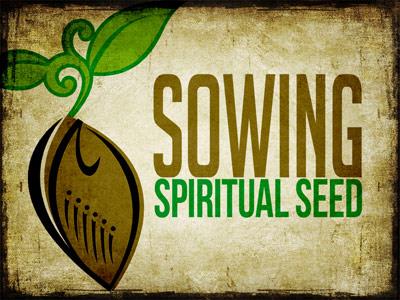-
"The Parables Of Matthew 13” The Seed Is The Word Of God… We Just Sow
Contributed by Clarence Eisberg on Jul 14, 2023 (message contributor)
Summary: The message is not about the "way to heaven" but our walk. We are to sow the "seed" which is the word of God.
In Jesus Holy Name July 16, 2023
Text: Matthew 13:1-9 Pentecost VII - Redeemer
“The Parables of Matthew 13”
The Seed is the Word of God… We Just Sow
The message today is not about how to have peace with God not how to obtain heaven. It is about our walk, our responsibility as followers of Jesus. We begin in Matthew 13.
Matthew 13:1-2 sets the scene. Jesus was sitting by the sea. And a large crowd gathered around him to hear him speak or see him perform a miracle. “The Sea of Galilee was one of His favorite places to preach to large crowds by using a boat as His podium. The water was a sounding board and the sloping hills and curving coves were people sat was a natural amphitheater.” (Jesus A Theography p. 177) So Jesus climbed into a boat that was anchored at the shore. He sat down and spoke many things to them in parables.
This parable of the Seed and Sower is the first in a list of seven stories Jesus told in Matthew 13. (Read verse 1-3) Jesus gave these parables on “that same day.” What same day? The Sabbath. Later the same day on which He healed the man with the withered hand. This is the same day, the Sabbath on which the Pharisees accused Jesus Christ of working miracles by the power of the Devil.
It’s a nice day. The Sabbath services are over…everyone gathers on the hill side to hear Jesus. He is a captivating speaker and He might work another miracle.
“A farmer went out to sow his seed. As he was scattering the seed, some fell along the path, others fell on soil that was shallow, some where it was rocky and others fell on good soil.”
When I was growing up on the farm, my father rented a farm down the road from where we lived. We had cattle there in the pasture and raised corn and hay on other parts of the land. There was this one little 2-acre patch that was an odd shaped triangle. The land was plowed and disked and made ready for planting. But instead of hooking up the drill my father had me take a small bag in which he placed the alfalfa seed.
Attached to the seed bag was a long cloth tube with a metal end that regulated the flow of the seed from the bag as you moved your arm from side to side. That was before the invention of the whirly-bird hand crank used for planting grass seed or fertilizer on your yard.
I would walk up and down the field slinging the seed from side to side. Most of the seed fell on the prepared soil but I’m sure that as I walked near the edge of the field along the road some seed did not fall on good soil. The birds had a field day.
The parable of the Seed and the Sower in Matthew 13 provide answers to the disciples regarding the success or failure of the Word of God. In verse 10 the disciple ask: “Why do you speak in parables?” Jesus quotes the O.T book of Isaiah in reference to why the Pharisees are rejecting His claim to be the Messiah, even though they have seen His miracles.
In order to understand the parable of the Seed and Sower, and the parable of the Weeds in Matthew 13 you must read it in the context of Matthew 12.
Matthew 12 begins with Jesus and his disciples walking in the grain fields. When the Pharisees see the disciples rubbing the grain in their hands, they challenge Jesus for allowing His disciples to break Sabbath rules. “Jesus: It is a Sabbath day. What your disciples are doing is considered work.”
By nature the Pharisees were rule keepers in order to please God. They were focused on traditions, rituals, and “bylaws”, rules and regulations of the Jewish religion. When Jesus arrived, many Jewish leaders missed the spiritual reality of Jesus because they were blinded by their religion.” (Who Broke my Church Kent Hunter p. 155)
In other words the disciples are asking: Jesus… “If you are who you say you are, why doesn’t every one believe in your message? A second question might be: “why are the religious leaders rejecting His message?”
These are questions that still ring across the centuries. Why does a wife believe and her husband reject? Why does one brother become a missionary and the other a pornographer? Why do two children raised in the same family end up with completely different values? How is it that the same Word of God produces such differing results in the human heart?
Jesus said the seed is the Word of God (Luke 8:11). It’s the only thing

 Sermon Central
Sermon Central



